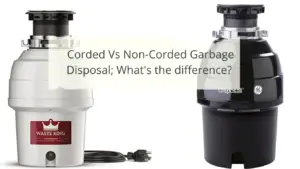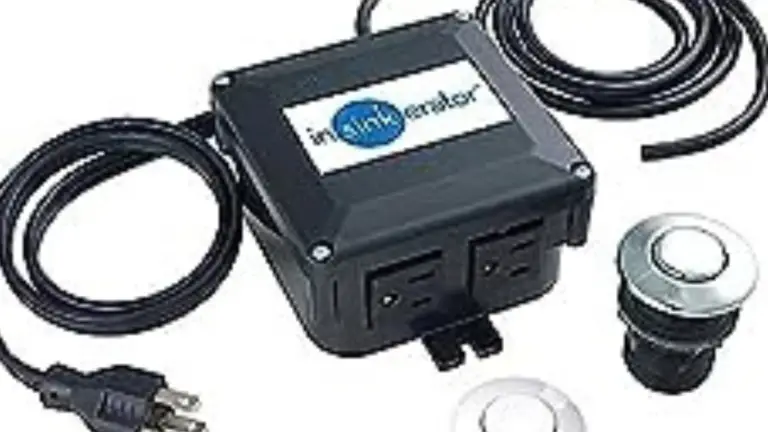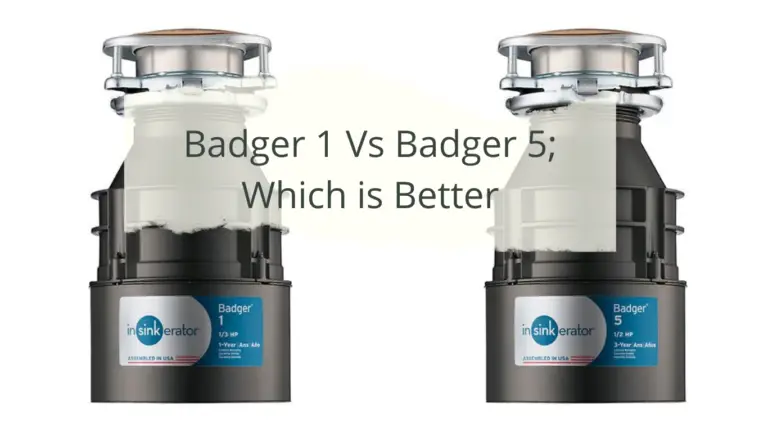Corded Vs Non-Corded Garbage Disposal; Which is Better?
This post may contain affiliate links which means I may receive a commission for purchases made through links.

When looking for the best garbage disposal for your kitchen sink, one question that usually arises is whether you should opt for a non-corded or corded model. As the name implies, corded garbage disposals have a pre-installed power cord for an easy plug-in, providing a straightforward setup process. On the other hand, non-corded models require a separate power cord, which will demand additional time and greater attention to detail. However, non-corded units also have their benefits. In fact, both corded vs non-corded garbage disposal units have their pros and cons, which you must consider before settling on any model.
Continue reading this article to know which option is better between a Corded vs non-corded garbage disposal!
What is a corded garbage disposal?
Also known as plug-in garbage disposals, corded garbage disposals are a popular option for homeowners as they’re easy to use and install. More notably, they come with a power cord preinstalled, making them a better option if your kitchen already has an existing power outlet. Plus, this eliminates the need to buy a separate power cord when installing these units underneath your kitchen sink.
Another notable thing about corded garbage disposals is that they’re considered more powerful than their non-corded counterparts since they’ve got a direct connection to a power source. Not to forget that most home kitchens already have a pre-existing electrical outlet with a standard voltage of 120 – 240V.
However, these units are more costly than non-corded models. Other than that, corded garbage disposals are considered more convenient as you can plug them into any outlet.
Benefits
- Corded garbage disposals work with any standard voltage of between 120 & 240V.
- They’re powerful and durable
- A perfect choice if you intend to use an air switch
- Easier to run and install than non-corded models
- Easy to use as you only need to plug them into a regular outlet
- Most corded garbage disposals shut off automatically when grinding is complete
Drawbacks
- Corded garbage disposals can only be installed in areas with pre-existing electrical outlets
What is a non-corded garbage disposal?
A non-corded garbage disposal refers to a type of food waste disposal unit that doesn’t need an electrical cord to operate. Instead, the unit is hardwired into your home’s electrical system. For that reason, you’ll need a professional electrician to install this type of garbage disposal.
On the bright side, this unit gives you more flexibility to use a plug-in cord or connect it directly to an electrical circuit to suit your needs and preferences. Best of all, these units can be installed anywhere in your home, making them a great option if you don’t have a power outlet under the kitchen sink.
Benefits
- Cheaper than their corded counterparts
- Reduces the risk of electrocution
- Ideal for homes that don’t have an electrical outlet under the kitchen cabinet
- Can be installed anywhere in your kitchen
Drawbacks
- Installation of non-corded garbage disposals should be done by a qualified electrician
Corded Vs Non-Corded Garbage Disposals; Key Differences
-
Connection
There are 2 ways of connecting a garbage disposal to an electrical power supply. That is; using a power cord to plug the unit into a wall outlet, or hard wiring the unit directly to a dedicated circuit.
Corded garbage disposals are plugged into a wall outlet since they come with a power cord pre-installed. However, non-corded units are wired directly to the electrical system by an electrician since they don’t have a pre-installed cord.
-
Installation
The installation of corded garbage disposals is usually quicker and requires fewer tools than the installation of non-corded units. After all, you only need to plug in your corded disposal unit to a regular wall outlet located under the sink, making it an excellent option for people who prefer a DIY installation.
In comparison, non-corded garbage disposals have a more complex installation process as they’re hardwired into the electrical system. For that, you cannot partake in the installation of a non-corded disposal as a DIY project. Instead, you have to hire the services of a qualified electrician. Unfortunately, this will end up increasing the time and overall cost of installing the non-corded garbage disposal unit.
-
Cost
Talking of cost, corded garbage disposals are generally less costly than their non-corded counterparts due to the simple installation process. As mentioned above, you’ll need to hire an electrician when installing a non-corded disposal, thus increasing the overall cost of the unit.
All in all, both corded and non-corded garbage disposals are available in a wide range of pricing options based on the model, brand, and features. Therefore, you can easily find the ideal garbage disposal unit, whether corded or non-corded, depending on your budget.
-
Performance
When it comes to performance, corded garbage disposals are considered to be more powerful than their non-corded counterparts. This is because non-corded models run off their internal power, while corded units are directly connected to the power source, making them more powerful.
Which is better: Corded or Non-Corded garbage disposals?
When choosing between a non-corded and corded garbage disposal, consider the benefits and drawbacks of each type. In addition, consider other factors like the installation process, and cost to find the ideal unit to suit your needs.
In general, if you want a garbage disposal with a simple installation process, a corded model is an excellent option. Especially if you’ve got a pre-existing outlet under the sink. However, if you want a unit that offers greater safety and a cleaner appearance, a non-corded model is a great option. That is because there are no visible power cords. Moreover, they give you more flexibility as you can install them even in areas that don’t have a power outlet.







